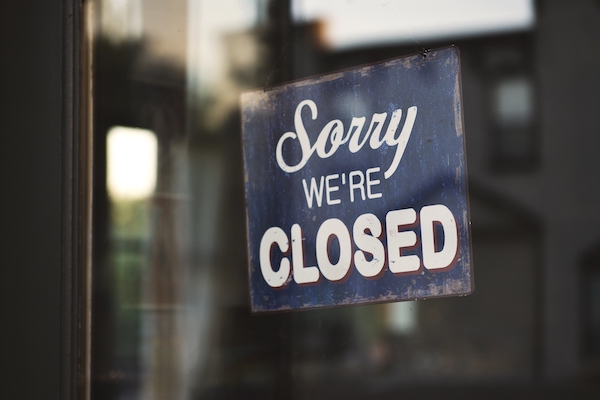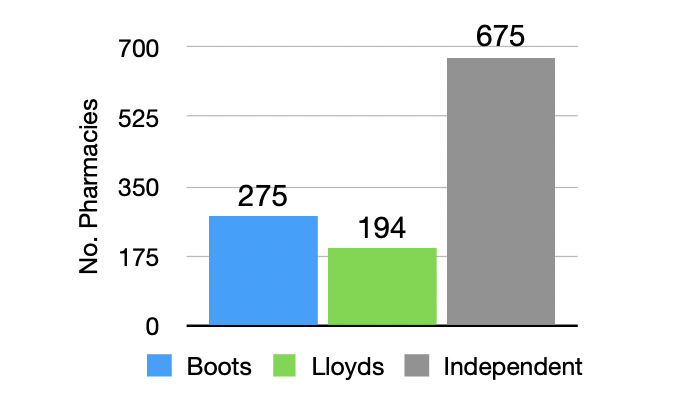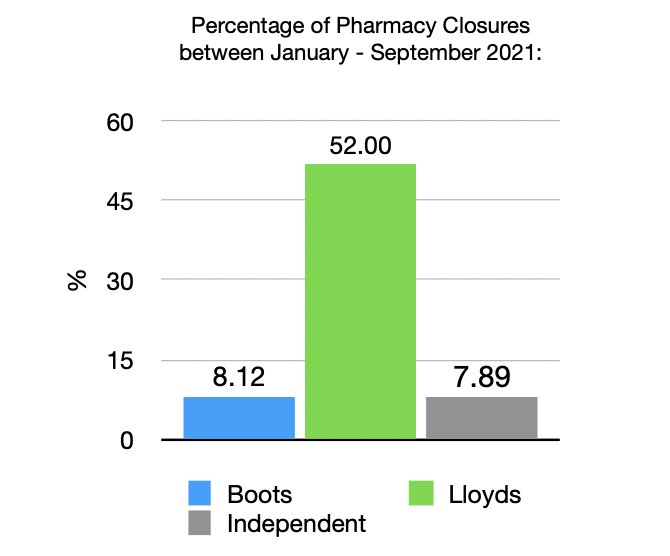I Need My Medicine. Why are So Many Pharmacies Closed These Days?
21 Jun . 4 min read.

Have you ever felt let down by your community pharmacy? Whether it is because your prescription was not ready as expected, items were not in stock, or as of late, the pharmacy is closed due to the absence of a legally responsible individual, i.e. the pharmacist. Seemingly, Lloyds Pharmacy appear to be the most heavily impacted. In this article, we will tackle this issue and attempt to understand why this is happening.
There are approximately 1250 community pharmacies in Scotland. Unfortunately, between the 9 month period of January and September 2021, 964 pharmacy closures were reported to their NHS health boards across Scotland.
Before we dive into this issue further, we need to understand market dominance i.e. who owns the majority of pharmacies across Scotland. For simplicity, we will be focusing only on the two largest multiples, Boots and Lloyds, and will be using Independent pharmacies as our control for comparison.
Number of Pharmacies owned by Boots, Lloyds Pharmacy and Independents across Scotland:
- Boots: 275 pharmacies (22%)
- Lloyds: 194 pharmacies (15.52%)
- Independents: 675 pharmacies (54%)

We can see that Boots, as a single company, currently dominate the market with 275 stores. Lloyds follow closely second with 194 stores. Independent pharmacies make up the majority of pharmacies across the nation - keep in mind this consists of hundreds of individual owners.
From these figures, we would expect Boots to be the most heavily impacted by pharmacy closures. Let’s look at some more data below.

We can see Lloyds, despite owning less pharmacies than Boots, were responsible for the greatest degree of pharmacy closures.
This data has unfortunately revealed more questions than answers such as:
Why are Lloyds struggling so much more than Boots, despite overseeing less stores.
Why are Boots and Independent pharmacies able to source Locum pharmacists far more efficiently than Lloyds in the same period of time?
Lloyds claimed, in an article published in The Chemist and Druggist, that pharmacy closures are due to a severe shortage of pharmacists, primarily Locums. However, this still leaves the above questions unanswered.
In addition, Lloyds Pharmacy have been found to be responsible for approximately 72% (80/112) of pharmacy closures in a local health board. This is disproportionately high and rather upsetting for its patients.
So what’s the problem?
Perhaps community pharmacy has become too commercialised over the decades, with higher emphasis on profits rather than patient care. Unfortunately, it is the patient who suffers most at the end of the day. The individuals who are passed around like tokens in a fairground as they seek urgent healthcare expertise, only to be let down when they arrive at the front doorstep of a closed pharmacy with the notice “Unfortunately, due to unforeseen circumstances, the pharmacy will not be open today due to the absence of a pharmacist”.
It is not unreasonable to assume pharmacists are leaving the sector to seek refuge elsewhere due to a lack of support and increasingly pressured targets set by multiples. Business is business, that much is correct. However, to what extent must patient care be continually compromised for businesses to continue surviving, or is it solely based on growth?
Maybe there are not enough pharmacists to cover these stores. However, this does not explain why Lloyds are struggling the most. For clearer data on the number of pharmacists qualifying and retiring each year and the distribution of pharmacists across UK please see the following links: https://pharmacistcoop.co.uk/articles/uk-pharmacist-distribution-data-source-gphc/ and https://public.tableau.com/app/profile/tohidul.islam/viz/DataVizofNumberofPharmacistsinUK/Story1
Like an extinguished match, perhaps pharmacists and their teams are burnt out and have been since the announcement of the pandemic.
Maybe it is a money thing. Considering salaries for both pharmacists and dispensers have not kept up with inflation in nearly 20 years, many individuals have decided to seek alternative, less stressful careers, such as working in the fast-food industry which currently pays its staff approximately 10p per hour more than that of a trained pharmacy dispenser. Pharmacists, on the other hand, can make approximately the same salary managing the said fast-food restaurant. Given the responsibility involved in the dispensing of life-saving medication, maybe the marginal pay cut is worth it after all - at least you get a free lunch and a cool hat.
So what’s the solution?
That is for everyone to decide. Perhaps the issue surrounding pharmacy closures isn’t as simple as what we are told by Lloyds.
Side Note
It appears Lloyds are currently refusing to hire Locum pharmacists who are set up as a limited company - i.e. those with a business account. An explanation for this could be it lessens IR35 responsibilities. Does this sound like gibberish to you? Let me explain. IR35 was introduced by the HMRC to ensure companies, such as Lloyds, undertake appropriate procedural assessments in their dealings with freelance contractors i.e. Locum pharmacists. Being inside IR35 means a greater degree of responsibility for those who hire Locums to work at regular pharmacies. You can read more about it on the HMRC website, or ask your accountant.
I hope this article illustrates some of the complexities which surround the issue of pharmacy closures in Scotland.
Author: Anonymous
Why is the author anonymous?
Some pharmacists who write articles to highlight the current issues in the sector prefer to remain anonymous because of the high risk of being blacklisted by pharmacy chains for essentially highlighting their failings. We give voice to those who cannot speak up due to fear of losing their livelihood and we hope these articles will shine a light on the sector and help us improve the situation for us and our patients.